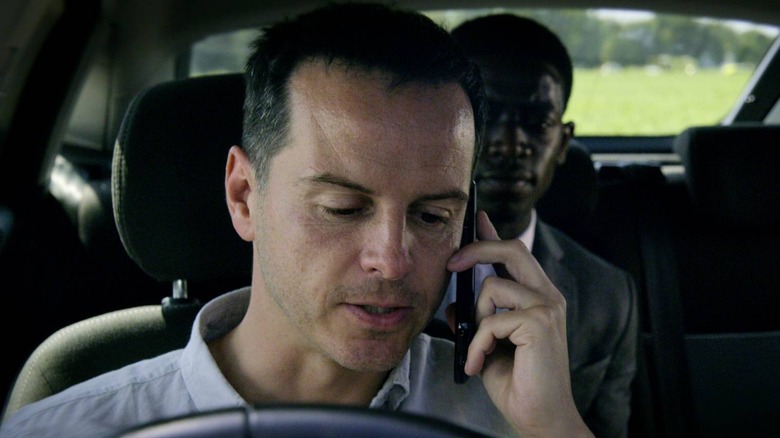Black Mirror's Charlie Brooker Equates Watching The Show To Being Hit By A Car
"Black Mirror" is one of the most visionary TV shows in modern times. The anthology series creates an entirely new story with each episode, tackling a different piece of technology or social construct through various genre lenses, like psychological horror or political satire. The show's so intense it can be challenging to watch at times, as the characters' use of technology hits a little too close to home, which may put the series at odds with Netflix's typical binge-watch model.
The show's creator, Charlie Brooker, and executive producer, Annabel Jones, spoke with Collider around the time of the release of Season 3. The idea of binge-watching "Black Mirror" came up, and the two weren't sure how good of an idea that was with this particular show. Brooker explained, "It's interesting, I don't know that we're much of a binge-watching show. It's a bit like being hit by a car. How many times can you get hit by a car, in one day? I don't know to what extent people watch one episode after the other with us because we give you a beginning, a middle and an end. We're not teasing you out."
"Black Mirror" certainly doesn't end one episode with a tease of what will occur next. Each episode functions as its own short film, sometimes with an absolutely devastating revelation, like in Season 3's "Playtest," easily one of the most disturbing "Black Mirror" episodes. And given the pertinent themes, it may do viewers good to stretch out their viewing experience somewhat.
Black Mirror episodes resonate longer than other shows
Death and fates worse than death are common occurrences in "Black Mirror." It's certainly a heavy show with themes and ideas that may not fully realize themselves in the mind until one ruminates on them a bit. As such, Charlie Brooker's comments make sense in that it may do viewers some good to take a break from binge-watching "Black Mirror" so that they can fully appreciate what they just saw. Annabel Jones had a similar opinion: "The episodes often resonate much longer after you're watched them. You go away and they're still rattling around in your head and you're still coming to terms with them. Some of them are quite challenging, and some of them raise interesting questions. It's a full meal. You need to go away and digest."
Of course, now that "Black Mirror" is on Netflix, which invented the binge-watch model, it's easy for viewers to sit there and watch an entire season all at once. While the people who make the show think there's value in letting an episode sit with you for a while, they're not opposed to going all in if you can handle it. Jones went on to say, "I don't recommend not binging. People have that option on Netflix, which is great. If you want to watch them in one go and can stomach them, good."
The Netflix era of "Black Mirror" also showed them pursuing more comedic and romantic premises, like Season 3's "San Junipero," considered by many to be the best episode of "Black Mirror." As such, it may not be as mentally taxing to watch a couple of episodes in a row. But if you need a break, take it from the creatives and step away if necessary. Your mental health may thank you.

